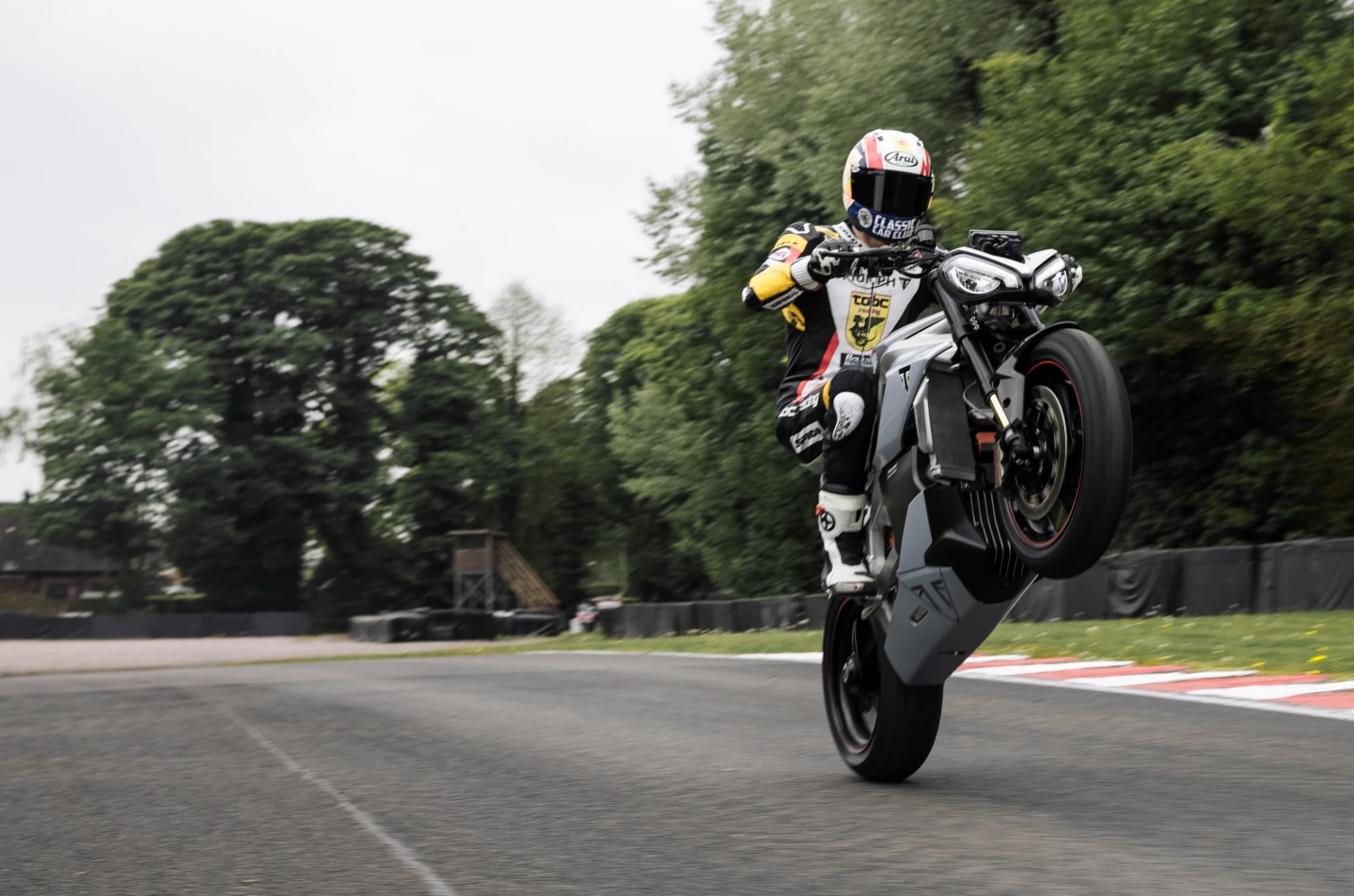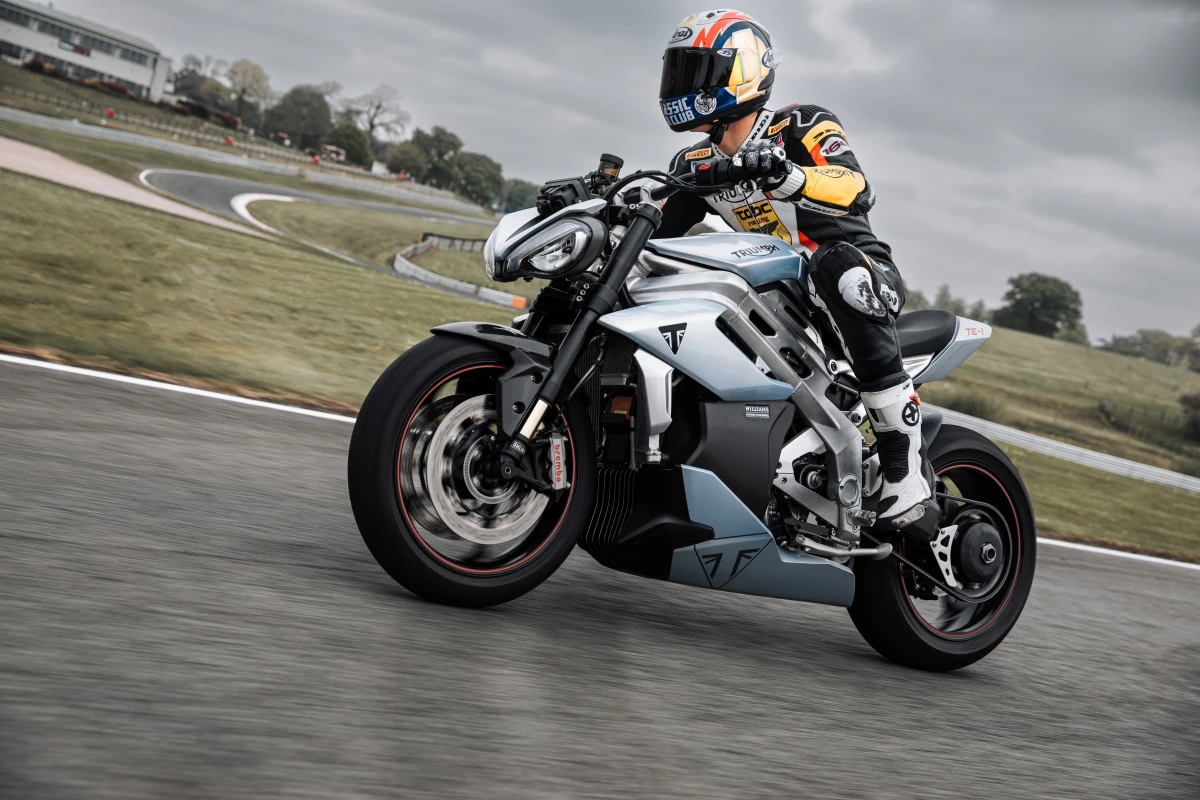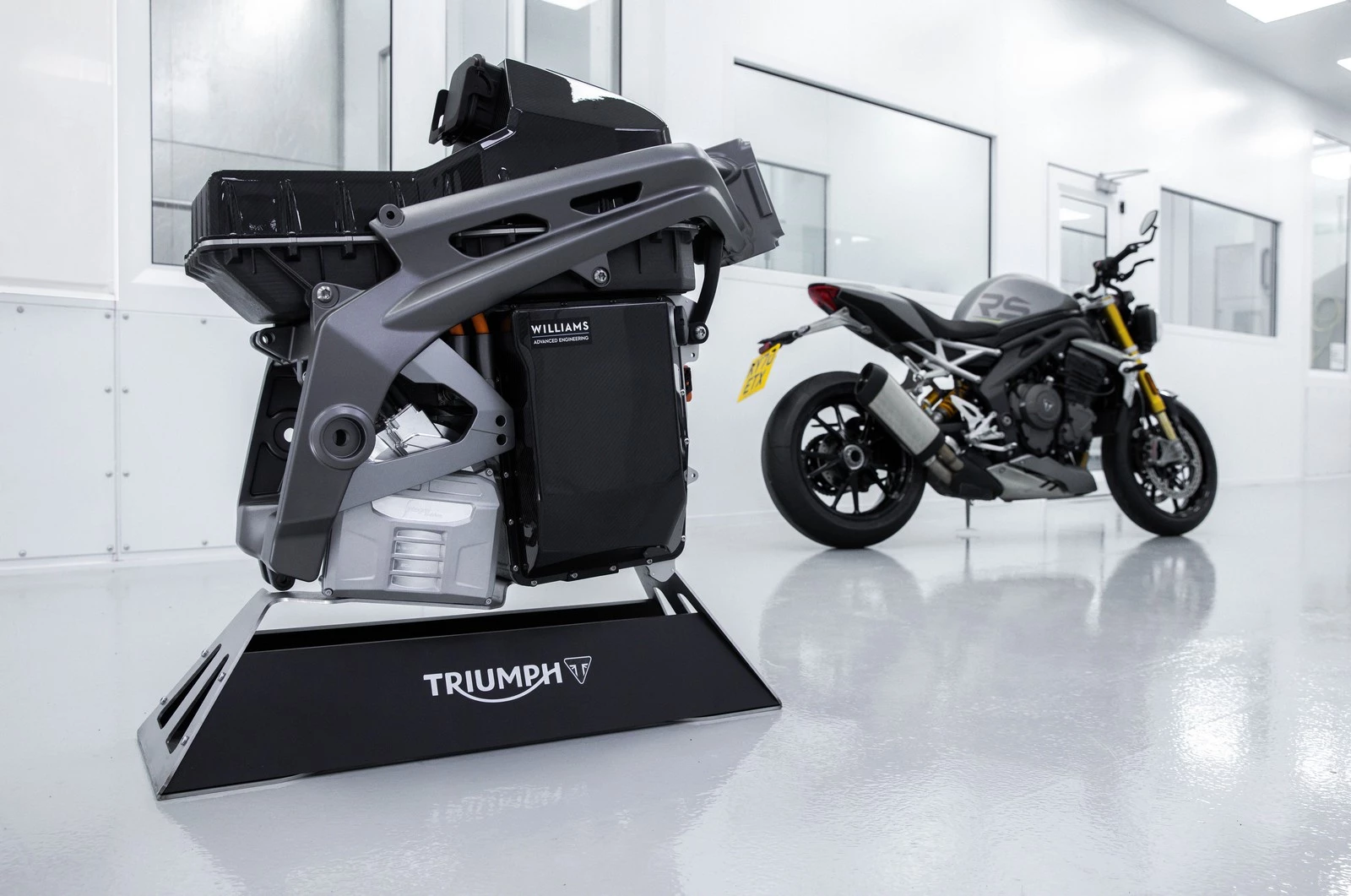The final phase of the TE-1 project put the working prototype through testing for the first time, managing results that uphold initial claims of game-changing tech, but a production electric motorcycle from Triumph is unlikely to come any time soon.
Triumph partnered with Williams Advanced Engineering (WAE), Integral Powertrain, and the University of Warwick in 2019, pursuing the creation of its first electric motorcycle, backed by the Innovate UK initiative. By March 2021 the first phase of the TE-1 project led to the unveiling of the prototype frame, engine and battery block, adding some impressive numbers regarding performance and charging times.
The first official sketches of the motorcycle followed a few months later, sprinkled with some more detailed specs; 175-hp (130-kW) peak power, 15-kWh battery capacity, and 0-80 percent charge in less than 20 minutes sounded delicious.
The third phase of the prototype’s development was completed in early 2022 prompting Triumph to reveal the official photography of the motorcycle. Benchwork over, it was then time for the fourth and final phase, where Daytona 200 champion racer, Brandon Paasch, got to test the working prototype on the race track.

All the intriguing theoretical figures that had been publicized had to be substantiated in practice. Triumph says the TE-1 did just that; in fact, it “exceeded expectations.” The motorcycle seems wildly enjoyable, as underlined by the enthusiastic review from the test rider.
“The throttle response on the TE-1 is kind of incredible, it’s very torquey and when you first touch the throttle it’s instant power, which is obviously what I love as a motorcycle racer – I love when it’s super-torquey and picks up right away, so for me it was a really great experience,” said Paasch. “I got to peg this thing all the way from zero to 100 percent throttle and it’s unbelievably quick, it pulls like crazy.”
Integral Powertrain’s 175-hp electric motor weighs just 10 kg (22 lb), produces peak torque of 109 Nm (80 lb.ft) and offers outstanding performance. The official test results include 0-60 mph (0-96 km/h) standing start acceleration at 3.2 seconds, and 0-100 mph (0-160 km/h) at 6.2 seconds, prompting a direct comparison to its own Speed Triple which boasts similar performance and power figures from its 1,200-cc in-line triple engine.
At 220 kg (485 lb), the TE-1 prototype would probably top its class in the electric market, while Triumph has revealed that its physical dimensions are comparable to the, even slimmer, Street Triple.

The 360-V battery pack plays a pivotal role in the bike’s size. Triumph and WAE promised a slim and very energy-dense package, and by the looks of it they’ve achieved it. There’s hardly any information regarding the technology used here, but a 2021 strategic collaboration between WAE and Nyobolt just might have something to do with it. Nyobolt has developed a new class of niobium-powered lithium-ion battery technology, promising exactly what the TE-1 boasts: denser energy storage, key to lower weight and smaller dimensions, and ultra-fast charging.
Testing results claim a per-charge range of 161-km (100-miles), although Triumph does not reveal the riding conditions under which this was generated, mentioning only that it was “based on live testing and official projections.”
For the time being, on the range matter we’ll have to rely on the credibility of WAE and Triumph, both of which also trumpet 20-minute battery charging time from zero to 80 percent capacity.
No mention has been made on electronic safety and control systems, a feature that has certainly been part of the testing strategy. Triumph has plenty of expertise on tuning electronic kits to handle both engine performance and motorcycle dynamics, and in fact confirms that the prototype's throttle action and torque delivery maps derived from the Speed Triple 1200 RS.

Some parameters of the electronic kit also influence power consumption, namely the traction control and front wheel lift control systems. The evolution of this software, based on the telemetry data collected on the road, together with managing regenerative braking, points to another energy-saving path.
Triumph has also worked on the soundtrack of the TE-1, stating that it produces a distinctive sound building to a spine-chilling crescendo. Admittedly, the culprit can be traced to the primary transmission, in the shape of a helical gear described as unique.
As far as handling is concerned, Triumph promises performance comparable to its current triple cylinder sports motorcycles. Taking it a step further, Paasch wished he could have raced the TE-1 at Daytona 200, amazed at the way it corners. Once again, it all sounds delicious.

The working prototype looks convincingly like a production-ready model, sporting styling cues that intuitively relate to the Speed Triple clan. Unfortunately, there’s very little chance we’ll get to see it in Triumph showrooms.
“We have already seen an incredibly positive reaction to the TE-1 prototype from motorcyclists all around the world, where many people are telling us that for the first time, they are seeing an electric motorcycle as desirable, and something that they would genuinely want to own,” said Steve Sargent, Chief Product Officer, Triumph Motorcycles. “Being the first step in our journey towards developing our future approach to electric powertrain technology, the TE-1 prototype and the incredible results it has achieved in its intensive testing program has provided crucial insights and capabilities that will ultimately guide our future development. Of course, the final production motorcycle will not be exactly what you see here today, but rest assured, the models we do develop will encompass all of its learnings and its exciting dynamic spirit.”
Though many would have craved an imaginary road-legal TE-1, probably only a very few would be able to afford it, but the bottom line is that Triumph’s electrification plans have no specific timeline as of yet. The company does have some impressive testing results though, and a lot of room for optimism with a solid technological base for Triumph to plant its next day.
Source: Triumph













